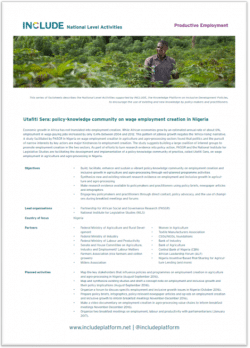
To encourage the use of existing knowledge in policy engagement in African countries and to facilitate the uptake of the findings of NWO-WOTRO & INCLUDE research projects at the national level or to fill gaps in INCLUDE’s knowledge agenda not covered by these projects, INCLUDE supports policy-knowledge communities that are initiated by Platform members and supported by INCLUDE.
Economic growth in Africa has not translated into employment creation. While African economies grew by an estimated annual rate of about 6%, employment in wage-paying jobs increased by only 0.4% between 2004 and 2012. This pattern of jobless growth negates the ‘Africa rising’ narrative. A study facilitated by PASGR in Nigeria on wage employment creation in agriculture and agro-processing sectors found that politics and the pursuit of narrow interests by key actors are major hindrances to employment creation. The study suggests building a large coalition of interest groups to promote employment creation in the two sectors. As part of efforts to turn research evidence into policy action, PASGR and the National Institute for Legislative Studies are facilitating the development and implementation of a policy-knowledge community of practice, called Utafiti Sera, on wage employment in agriculture and agro-processing in Nigeria.








